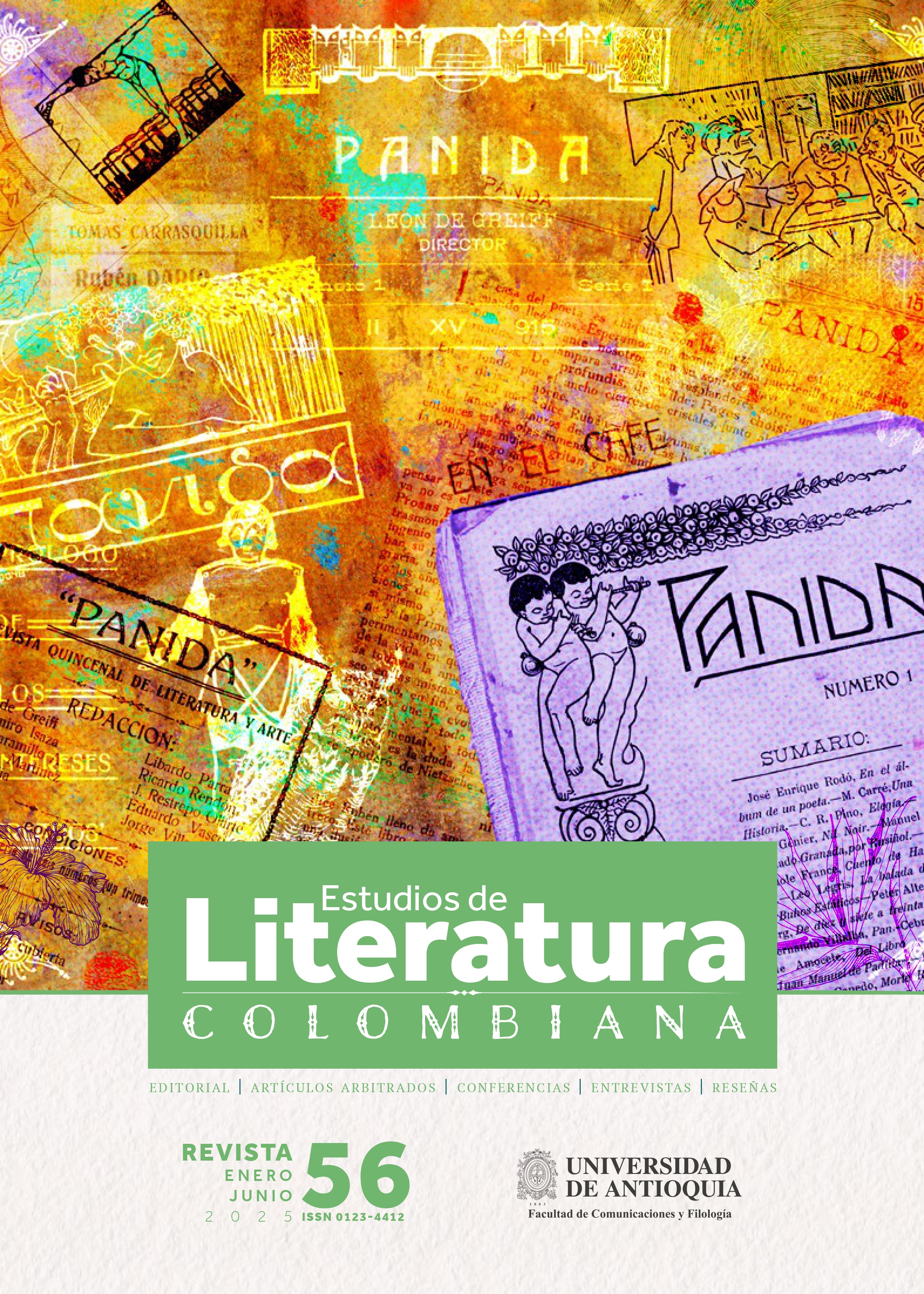Civilization and Education of Neo-Granadian Women in Una Holandesa en América [A Dutchwoman in America] (1888) by Soledad Acosta de Samper
DOI:
https://doi.org/10.17533/udea.elc.354661Keywords:
Una holandesa en América, Soledad Acosta de Samper, intersectionality theory, 19th-century Colombian literatureAbstract
This article offers a proposal for analysis of Una holandesa en América (1888), by Soledad Acosta de Samper. To determine how the conditions of education were imposed on women in New Granada, we use the concept of intersectionality (Lugones, 2014). It is concluded that Lucía, a character who represents the author’s thought in the face of the social situation of the 19th century New Granada woman, is still far from proposing female emancipation by educating her sisters from their privileged position.
Downloads
References
Acosta de Samper, S. (2015). Una holandesa en América. Bogotá: Ministerio de Cultura, Biblioteca Nacional de Colombia. https://catalogoenlinea.bibliotecanacional.gov.co/client/es_ES/search/asset/107047/1
Alzate, C. (2012). Otra amada y otro paisaje para nuestro siglo xix. Soledad Acosta de Samper y Eugenio Díaz Castro frente a María. Lingüística y Literatura (59), pp. 117-135. Recuperado de https://revistas.udea.edu.co/index.php/lyl/article/view/12537 [26.05.2024] .
Alzate, C. (2018). El panorama como simulacro. Tecnologías de la mirada colonial en Una holandesa en America (ca.1880), novela ilustrada. H-ART. Revista de historia, teoría y crítica de arte 3, pp. 141-166. DOI: 10.25025/hart03.2018.06
Alzate, C. (2019). Periodismo, novela e imagen en torno a 1880. Soledad Acosta de Samper y su narrativa visual de cortar y pegar. Cuadernos de Literatura 23 (45), pp. 330-351. DOI: 10.11144/Javeriana.cl23-45.pnit
Arango Rodríguez, S. (2010). De la poesía a la prosa, o imágenes de la formación femenina en el proyecto de nación colombiano del siglo xix. Historia Caribe 17, pp. 67-88. Recuperado de https://investigaciones.uniatlantico.edu.co/revistas/index.php/Historia_Caribe/article/view/30/17 [26.05.2024]
Loaiza, G. (2014). La expansión católica. En Poder letrado. Ensayos sobre historia intelectual de Colombia, siglos xix y xx (pp. 121-164). Cali: Universidad del Valle.
López, L. (2017). The feminine characters in Soledad Acosta’s Una holandesa en América and the construction of a new national mode. Nomenclatura: aproximaciones a los estudios hispánicos 5. DOI: 10.13023/naeh.2017.02
Lugones, M. (2011). Hacia un feminismo descolonial. La manzana de la discordia 6 (2), pp. 105-119. Recuperado de https://repositorio.unal.edu.co/handle/unal/53791 [26.05.2024]
Lugones, M. (2014). Colonialidad y género: hacia un feminismo descolonial. En W. Mignolo (Ed.). Género y descolonialidad (pp. 13-42). Buenos Aires: Del Signo. http://www.lrmcidii.org/wp-content/uploads/2015/05/Genero_y_Descolonialidad.pdf
Ramírez Jaramillo, J. F. (2020). La mujer en el contexto de la civilización moderna. En Ángel Cuervo: perfiles de un intelectual moderno (pp. 127-146). Medellín: Editorial Universidad de Antioquia.
Renjifo López, L. (2006). Una holandesa en América (1876) de Soledad Acosta de Samper: novela fundacional, género y ciudadanía [Tesis de grado, Universidad de los Andes]. Recuperado de https://repositorio.uniandes.edu.co/bitstream/handle/1992/25577/u271910.pdf?sequence=1&isAllowed= [26.05.2024]
Rodríguez Rodríguez, C. (2016). Las protagonistas de Jane Austen y Soledad Acosta de Samper. Reescribiendo el ideal femenino. Estudios de Literatura Colombiana 38, pp. 163-180. DOI: 10.17533/udea.elc.n38a08
Santana Lima, A. (2019). Educação das Mulheres na América Latina: um olhar decolonial. Educação & Realidade 44 (3), e83134. DOI: 10.1590/2175-623683134
Torrado, S. (7 de marzo de 2021). Las olvidadas de América. Soledad Acosta de Samper. El País. https://elpais.com/internacional/2021-03-07/soledad-acosta-de-samper-una-corresponsal-adelantada-a-su-tiempo.html
Vallejo, C. (2005a). Dicotomía y dialéctica: Una holandesa en América y el canon. En C. Alzate & M. Ordóñez (Eds.). Soledad Acosta de Samper: Escritura, género y nación en el siglo XIX (pp. 289-300). Madrid/Fráncfort del Meno: Vervuert Verlagsgesellschaft.
Vallejo, C. (2005b). Legitimación de la expresión femenina y apropiación de la lengua en Una holandesa en América (1876) de Soledad Acosta de Samper: dialéctica de cultura y traducción. En C. Alzate & M. Ordóñez (Eds.). Soledad Acosta de Samper: Escritura, género y nación en el siglo XIX (pp. 483-492). Madrid/Fráncfort del Meno: Vervuert Verlagsgesellschaft.
Published
How to Cite
Issue
Section
License
Copyright (c) 2025 Estudios de Literatura Colombiana

This work is licensed under a Creative Commons Attribution-NonCommercial-ShareAlike 4.0 International License.
Authors who publish in Estudios de Literatura Colombiana must meet the following criteria for authorship:
- Substantial contributions to the conception and design of the work; and the acquisition, analysis, or interpretation of data for the work.
- Drafting the work or revising it critically for important intellectual content.
- Final approval of the version to be published.
- Agreement to be accountable for all aspects of the work in ensuring that questions related to the accuracy or integrity of any part of the work are appropriately investigated and resolved.
In addition, the authors agree to the following terms:
- The authors are accountable for the content of the work.
- Estudios de Literatura Colombiana is not responsible for aspects related to copying, plagiarism or fraud that may appear in the articles published in it.
- It is the authors' responsibility to obtain the necessary permissions to reproduce any copyrighted material. When photographs or personal data are to be reproduced and disseminated in printed or digital form, informed consent is required. Therefore, this requirement must be met by the authors upon receipt of the manuscript.
- The authors retain moral rights and transfer their economic rights to Estudios de Literatura Colombiana, which will correspond to the Universidad de Antioquia, to publish the articles on the website, brochures, social networks, distribute electronic copies, include them in indexing services, directories, national and international database repositories, under the Creative Commons Attribution-Noncommercial-Share Alike 4.0 International Commercial License (CC BY-NC-SA).
- The authors will sign the declaration of transfer of economic rights to the Estudios de Literatura Colombiana, after acceptance of the manuscript.
- Authors may not withdraw the manuscript once it has been approved for publication. Otherwise they will have to bear the costs of the process. If they intend to withdraw the manuscript before its approval, they must send an official statement approved by all the authors.
- The material created by you may be distributed, copied and exhibited by third parties if and only if it is specified in the credits. No commercial benefit may be obtained and derived works must be compulsorily under the same terms of the Creative Commons Attribution-Noncommercial-Share Alike 4.0 International Commercial License (CC BY-NC-SA) used in the original work.














